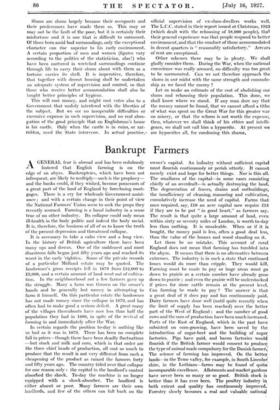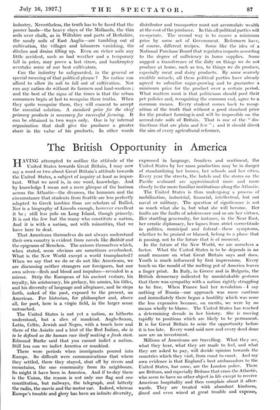Bankrupt Farmers
A GENERAL fear is abroad and has been sedulously fostered that English farming is on the edge of an abyss. Bankruptcies, which have been not infrequent, are likely to multiply—such is the prophecy— and the banks could, if they wished, become possessors of a great part of the land of England by foreclosing mort- gages. There is a cry for wholesale Government assist- ance ; and with a certain change in their point of view the National Farmers' Union seem to seek the props they recently scorned. Farming is a basal industry in a sense true of no other industry. Its collapse could only mean ill-health in the body politic and indeed the body social. It is, therefore, the business of all of us to know the truth of the present depression and threatened collapse.
It is necessary to take a calm view and a long view. In the history of British agriculture there have been many ups and downs. One of the suddenest and most disastrous falls began just fifty years ago and reached its worst in the early 'eighties. Some of the private records of a particular Midland estate may be quoted. The landowner's gross receipts fell in 1879 from £12,000 to £3,000, and a certain amount of land went out of cultiva- tion. In the neighbourhood not a few farmers gave up the struggle. Many a farm was thrown on the owner's hands and he generally lost money in attempting to farm it himself. On this particular estate the landowner has not made money since the collapse in 1879, and has often had to make good a serious deficit. A great many of the villages thereabouts have now less than half the population they had in 1880, in spite of the revival of farming in and immediately after the War.
In certain regards the position to-day is nothing like so bad as it was in 1879. There has been no complete fall in prices—though there have been deadly fluctuations —but stock and milk and corn, which in that order are the three chief heads of production, all cost so much to produce that the result is not very different from such a cheapening of the 'product as ruined the farmers forty and fifty years ago. The country tided over that collapse for one reason only : the capital in the landlord's control absorbed the shock. To-day the machine is no longer equipped with a shock-absorber. The landlord is either absent or poor. Many farmers are their own landlords. and few of the others can fall back on the owner's capital. An industry without sufficient capital must flourish continuously or perish utterly. It cannot merely exist and hope for better things. Nor is this all. The smallness of the capital—in some cases consisting chiefly of an overdraft—is actually destroying the land. The degeneration of fences, drains and outbuildings; the insufficiency of cleaning, manuring and cultivation, cumulatively increase the need of capital. Farms that once required, say, £10 an acre capital now require £15 if they are to be put " in good heart," as farmers say. The result is that quite a large amount of land, even within sixty or seventy miles of London, is worth -to-day less than nothing. It is unsaleable. When or if it is bought, the money paid is less, often a good deal less, than the value of the houses and wood standing on it.
Let there be no mistake. This account of rural England does not mean that farming has tumbled into the abyss. It means that there is no alternative between extremes. The industry is in such a state that continued losses would do more than cripple. They would kill. Farming must be made to pay or huge areas must go down to prairie as a certain number have already gone down to prairie ; and even the prairie will be understocked if prices for store cattle remain at the present level. Can farming be made to pay ? The ' answer is that a great deal of it does pay and has continuously paid. Dairy farmers have done well (until quite recently when the limit of supply has been reached) over the better part of the West of England ; and the number of good cows and the sum of production have been much increased. Parts of the East of England, which in the past have subsisted on corn-growing, have been saved by the introduction of sugar-beet and the building of sugar factories. Pigs have paid, and bacon factories would flourish if the British farmer would consent to produce the type of animal made compulsory for the Danish farmeii' The science of farming has improved. On the betteV lands--in the Teme valley, for example, in South Lincoln; , shire, in the Lothians—farms may be found of quite incomparable excellence. Allotments and market gardens have never been so many or so good. British stock is better than it has ever been. The poultry industry irt, both extent and quality •has continuously improved. Forestry slowly becomes a real and valuable national industry. Nevertheless, the truth has to be faced that the poorer lands—the heavy clays of the Midlands, the thin soils over chalk, as in Wiltshire and parts of Berkshire, the sandy soils of East Anglia—are tumbling out of cultivation, the villages and labourers vanishing, the ditches and drains filling up. Even on richer soils any little accident, such as bad weather and a temporary fall in price, may prove a last straw, and bankruptcy overtake some of our best cultivators.
Can the industry be safeguarded, in the general or special meaning of that political phrase ? No nation can afford to allow its soil to fall out of cultivation. Nor can any nation do without its farmers and land-workers ; and the best of the signs of the times is that the urban consumers begin at last to recognize these truths. When they quite recognize them, they will consent to accept the essential solution. A standard price for the chief primary products is necessary for successful farming. It can be obtained in two ways only. One is by internal organization that shall give the producer a greater share in the value of his products. In other words distributor and transporter must not accumulate wealth at the cost of the producer. In this all political parties will co-operate. The second way is to ensure a minimum price by some act of Government. Reformers have, of course, different recipes. Some like the idea of a National Purchase Board that regulates imports according to the degree of sufficiency in home supplies. Some suggest a transference of the duty on things we do not produce at home, such as tea, to things we do produce, especially meat and dairy products. By some scarcely credible miracle, all these political parties have already agreed to subsidize sugar-growing and to guarantee a minimum price for the product over a certain period. What matters most is that politicians should pool their pet policies and, recognizing the common end, agree to a common means. Every student comes back to recog- nition of the truth that without a good standard price for the product farming is and will be impossible on the second-rate soils of Britain. That is one of the " dis- tinctions that are plain and few " ; and it should direct the aim of every agricultural reformer.











































 Previous page
Previous page